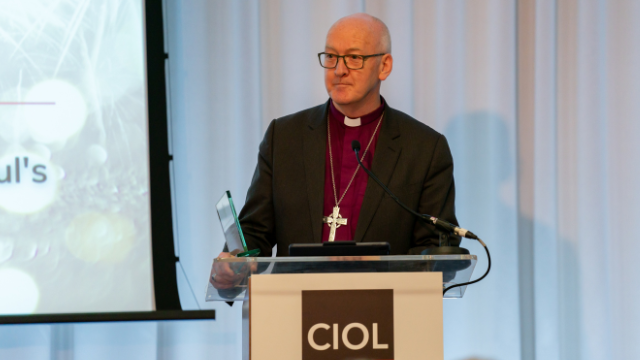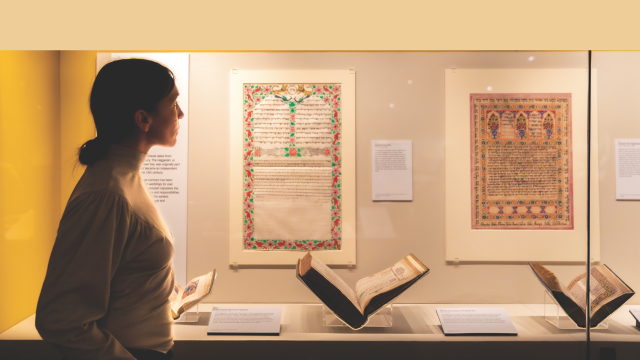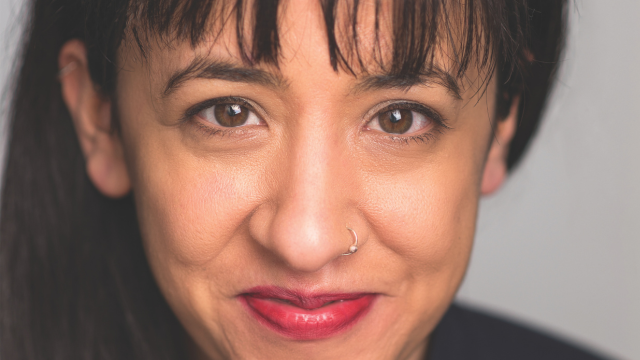-
QUALIFICATIONS
- For Linguists Worldwide
- For UK Public Services
- Preparation
- Policies & Regulation
-
MEMBERSHIP
- Join CIOL
- Membership grades
- NEW for Language Lovers
- Chartered Linguist
- Already a member?
- Professional conduct
- Business & Corporate Partners
-
ASSESSMENTS
- For Second Language Speakers
- English as a Second Language
-
EVENTS & TRAINING
- CPD, Webinars & Training
- CIOL Conference Season 2025
- Events & Networks
- CIOL Mentoring
-
NEWS & VOICES
- News & Voices
- CIOL eNews
- CIOL Awards
- The Linguist
- Jobs & Ads
-
RESOURCES
- For Translators & Interpreters
- For Universities & Students
- Standards & Norms
- CIOL & AI
- All Party Parliamentary Group
- In the UK
- UK Public Services
- Find-a-Linguist
John Worne meets Bishop Nick Baines
 The 2022 David Crystal Award winner reveals how languages have driven all aspects of his life, from growing up in Liverpool to becoming Bishop of Leeds
The 2022 David Crystal Award winner reveals how languages have driven all aspects of his life, from growing up in Liverpool to becoming Bishop of Leeds
Can you tell us a little about yourself and how you came to be a linguist?
Well, I grew up in Liverpool and went to a comprehensive school. It was an inspiring German teacher who really got me hooked on languages. Being a lad in a Liverpool comprehensive, French wasn’t a natural fit – you have to ‘act’ into it to get the accent right and we didn’t do that sort of thing at my school! German worked better for me; it seemed suitably sound and solid.
When it came to university, I didn’t have much confidence to do languages. I thought, “There must be special kinds of people – linguists – who do things like that.” I think there’s a lot of people like that. In the end I did German and French at Bradford, where they were doing a pioneering course which included practical elements towards being an interpreter or translator.
So what did you do next?
Having worked as a freelance technical translator there, I was offered a translating job in Germany. But my wife’s nursing qualifications weren’t easily transferable, so we decided to settle in the UK and I got a job at GCHQ, the intelligence agency. My first job was to retrain in Russian. This meant going from not knowing the alphabet to degree standard in nine months, then operational training for five months and then into a team. Later on I did language research and had about 20 languages going through my desk.
Is there anything else you can say about your work at GCHQ?
I think I’ll have to give you the classic answer: “If I tell you about that I’ll have to shoot you!”
That’s what I was rather hoping you’d say! So what happened after that?
I left GCHQ because I was always dealing with other people’s ideas and my confidence in myself was starting to grow; the confidence that I might have some of ideas of my own. Still, if you told me then that I’d be invited to speak at conferences with world leaders in a foreign language, and write books in German, I would never have believed you.
Where languages, and life, have led me is a completely different world from the one I grew up in; and my family and I still don’t quite believe it sometimes. Languages have really helped. If you’re ordained in the church, it’s no good just knowing the bare theology; theology is deeply rooted in language. You’ve got to be able to communicate and that means listening to the vocabulary and languages of the place you’re in.
One thing I always say to clergy going to a new parish is that you can learn the history, but you can’t share the memory: you have to ask, listen and learn. That’s interpreting in effect: communicating in the languages and registers of the people around you. You have to be ‘multilingual’ in our work, because different communities have different ways of speaking and hearing, especially when it comes to faith.
I guess having done that across ‘international’ linguistic boundaries gives you more tools to do it in a local context?
You know, I do what you might call public speaking every day of the week, but I use different language when I’m speaking in the House of Lords from when I’m on BBC
Radio 2, or going to a local parish church in the Yorkshire Dales. You have to be able to flex the language. I’m staggered sometimes when interviewers assume foreign politicians can speak English and ask really complicated questions. I think, “Ok let me do that to you in French and see how you get on!”
Yes, it’s amazing really. We could talk for hours on that particular topic.
It’s partly about borders and geography. In a couple of weeks, my wife and I will be staying with friends in Basel in Switzerland, where you can drive over three borders in 20 minutes – and countless linguistic frontiers. There’s nothing physical that says you’re in a different place but the languages change every few miles. When you live near borders you live on the edge. You live differently. Language works differently. You have to have a facility to be able to work both sides of the language divide. In places where physical and linguistic borders are potentially shifting, such as in Ukraine, your life may even depend on it.
This is why, at the CIOL Awards evening, I quoted Helmut Schmidt’s advice to young people thinking of going into politics: “Don’t think about it unless you speak at least two foreign languages to a competent degree; to understand your own culture you have to look through the lens of another, and for that you need language.”
You often speak in the media and the House of Lords about the importance of language learning and the UK’s national language capacity. What have been your most effective arguments?
There are a lot of people, particularly in politics, who just don’t get it. They think languages are just for people who like that sort of thing. And it’s quite hard to pitch to parliamentarians because it’s an eclectic audience. The House of Lords has some commonality; the House of Commons is much more unruly! So the line I’ve taken is that you are handicapped in many ways by not being able to speak another language because you can’t understand your interlocutors and, in a way, you can’t understand yourself, certainly as you appear in others’ eyes.
I also back up Baroness Coussins in the Lords on language-related matters, and bring the importance of languages into Lords debates on other matters. For me, the economic arguments for language learning are less important than the cultural ones. That is a bit simplistic, of course – you can’t actually divide them like that, and I make a pragmatic economic argument where appropriate – but the true worth in knowing another language is that it expands the imagination and the cultural hinterland. There are so many things that you have no sense of unless you’ve managed to jump out of our little goldfish bowl to swim in the seas of other cultures.
So what about your languages now?
When I left GCHQ I wasn’t able to travel for security reasons, so I didn’t speak German for around 15 years, and Russian for at least 19. When I was finally allowed to travel, I went to Kazakhstan for a Global Interfaith Conference and gradually the Russian came back. But I’ll never be fluent in Russian, while in the last six weeks I have done two academic conference papers in German, and I’m off preaching in May again in German.
Would you say you’ve reached a level of comfort in German that you never achieved in Russian then, or is it more a case of deterioration for lack of practice?
I think it’s both. If you study more than one language, most of us have an affinity with one in particular, and for me that is German. It’s the one with which I’m most comfortable – most at home if you like. I’m a plodder, not a great linguist; I’ve had to work at it. And when you learn a language very quickly and a few years later you’re not using it, I think you lose it more quickly.
Can you share a golden languages moment in your life?
I once preached in German to 130,000 people in Hamburg (live on television, too), and then two years later addressed an audience of 12,000 in Stuttgart with the now German President Frank-Walter Steinmeier and the then UN Secretary-General, Kofi Annan. My wife sometimes says, “Why do you say ‘yes’ to things that you later think, ‘What have I signed myself up for?!’” When I was asked to do this triple header I felt a complete fraud. I’d upset David Cameron by writing him an open letter about Middle East foreign policy, which The Observer published on its front page, and the Germans couldn’t understand how a bishop could have such impact on the political discourse.
I had pneumonia in the run up to this event, and at the end I had to be taken to hospital. So when I said ‘yes’ to that I perhaps wasn’t thinking at my best! I wasn’t thinking, “You’ll have to be able to operate in German on the same stage as two world leaders.” It’s German which opened all that up.
It’s a beautiful example! So if you had to persuade a young person to engage with languages what would you say?
I’d say, would you like to experience life in black and white or in Technicolor? Because if you have a language, the colours open up before you and you’ll see things you never expected to see.
Filter by category
More
The Chartered Institute of Linguists (CIOL), Incorporated by Royal Charter, Registered in England and Wales Number RC 000808 and the IoL Educational Trust (IoLET), trading as CIOL Qualifications, Company limited by Guarantee, Registered in England and Wales Number 04297497 and Registered Charity Number 1090263. CIOL is a not-for-profit organisation.








